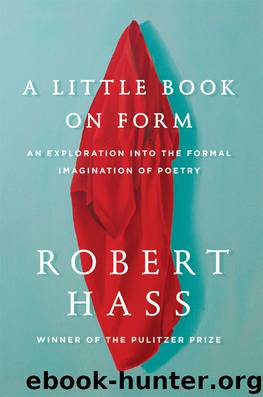A Little Book on Form by Robert Hass

Author:Robert Hass
Language: eng
Format: epub
Publisher: HarperCollins
Published: 2017-03-05T16:00:00+00:00
In this case right relation to nature is, it would seem, an eye to beauty and an imagination open to the myth-world.
HORACE
7.Horace published—I am a little hazy about what constituted publication during the reign of Caesar Augustus—four books of poems that have come down to us as odes. Horace himself called his poems carmina, “songs” in Latin. Later editors—probably in the Alexandrian period—called them odes, “songs” in Greek, but the poems were completely unrelated to the kind of formal, celebratory odes that Pindar and Baccyliades wrote. So later poets and historians tended to distinguish between the formal, or Pindaric, ode, and the informal and Horation ode. John Milton’s “On the Morning of Christ’s Nativity” is a formal ode. Pablo Neruda’s “To a Watermelon” is an informal ode. The odes of Keats, the middle- and late-eighteenth-century odes by poets you may or may not have read or heard of—Mark Akenside, William Collins, Thomas Gray, William Cowper, Charlotte Smith—are probably mixed cases. And Horace himself complicates the issue, because his books of songs include all sorts of poems, basically lyric poems on a wide range of subjects, that adapted the meters of early Greek poetry—of Sappho and Alcaeus—which got passed to the world through the schoolroom as odes.
Thus an Oxford University Press book on the ode by John Heath-Stubbs begins, “The term ‘ode,’ as applied to English poems, is, I suspect, a not infrequent source of puzzlement to the student.” One English critic of the nineteenth century tried to settle the matter by saying that Horace’s poems were not so much a genre as a flavor. Simplest to look at a couple of poems and at the way they passed into English. Early on in Horace’s experiments with Greek meters, Rome received the news of the defeat of Mark Antony and the death of Cleopatra, a moment of Roman triumph, Horace wrote a poem, as if ripped from the headlines, that came to be called the Cleopatra ode:
At last the day has come for celebration,
For dancing and for drinking, bringing out
The couches with their images of gods
Adorned in preparation for the feast.
Before today it would have been wrong to call
For the festive Caecuban wine from the vintage bins,
It would have been wrong while that besotted queen,
With her vile gang of sick polluted creatures,
Crazed with hope and drunk with her past successes,
Was planning the death and destruction of the empire.
But, comrades, she came to and sobered up
When not one ship, almost, of all her fleet
Escaped unburned, and Caesar saw to it
That she was restored from the madness to a state
Of realistic terror. The way a hawk
Chases a frightened dove or as a hunter
Chases a hare across the snowy steppes,
His galleys chased this fleeing queen, intending
To put the monster prodigy into chains
And bring her back to Rome. But she desired
A nobler fate than that; she did not seek
To hide her remnant fleet in a secret harbor;
Nor did she, like a woman, quail with fear
At the thought of what the dagger does.
She grew more fierce as she beheld her death.
Download
This site does not store any files on its server. We only index and link to content provided by other sites. Please contact the content providers to delete copyright contents if any and email us, we'll remove relevant links or contents immediately.
4 3 2 1: A Novel by Paul Auster(12393)
The handmaid's tale by Margaret Atwood(7764)
Giovanni's Room by James Baldwin(7346)
Asking the Right Questions: A Guide to Critical Thinking by M. Neil Browne & Stuart M. Keeley(5775)
Big Magic: Creative Living Beyond Fear by Elizabeth Gilbert(5772)
Ego Is the Enemy by Ryan Holiday(5450)
The Body: A Guide for Occupants by Bill Bryson(5097)
On Writing A Memoir of the Craft by Stephen King(4944)
Ken Follett - World without end by Ken Follett(4732)
Adulting by Kelly Williams Brown(4574)
Bluets by Maggie Nelson(4556)
Eat That Frog! by Brian Tracy(4540)
Guilty Pleasures by Laurell K Hamilton(4449)
The Poetry of Pablo Neruda by Pablo Neruda(4109)
Alive: The Story of the Andes Survivors by Piers Paul Read(4033)
White Noise - A Novel by Don DeLillo(4010)
Fingerprints of the Gods by Graham Hancock(4004)
The Book of Joy by Dalai Lama(3986)
The Bookshop by Penelope Fitzgerald(3853)
